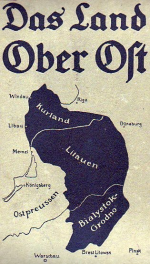Jackson Lennock
Well-known member
What if Russia under the Provisional Government withdrew from the First World War in April or May of 1917? The Russians cede Congress Poland and Ober Ost and open up to trade with Germany, but the borders elsewhere remain the same.
The Ottomans would probably be indignant since they wouldn't even get Kars and Batumi. I don't see why the Russians would give up Kars or Batumi when their troops in 1917 were in control of most of Western Armenia. Baghdad fell in Marc 1917, but without having to fight the Russians the Turks probably can defend Kirkuk, Sulaymaniyah, Mosul, Jerusalem, and Aqaba. It's also possible the Turks would be so mad to have gotten nothing that they'd try to negotiate a separate peace though.
The Americans declared war on April 6, 1917. I imagine they aren't taking that back just because the Russians withdrew. But if the Germans can shift troops from east to west a year earlier than OTL and purchase supplies (especially grain) from Russia to undermine the British blockade a bit, the Germans might win before the Americans can get enough troops to Europe to make a difference.
Lenin doesn't get sent by the Germans to Russia here. How does the Russian Republic develop without the Bolshevik Coup? Various generals might adopt a stabbed-in-the-back myth (especially since they could argue that with the Americans on the way, Russia could have won). Certain peoples and regions are bound to secure or retain autonomy ("Ukraine" comprised of OTL Poltava, Podolia, Volyhnia, Chernigov, and Kyiv Governorates - which was recognized OTL by Moscow as an autonomy; Finland which was already autonomous; Buhkhara and Kokand which were protectorates; a "Transcaucasia" federation comprised of Georgia, Armenia, and Azerbaijan) but other groups would be bound to make demands as well and some regions (like Ukraine) probably would demand more autonomy or more lands to be under their authority. There would be a mix of right-wingers annoyed with the Republic, Leftists, and Regional/Nationalist movements producing instability.
The Russian Civil War produced between 7 and 12 million dead. Another 2 million fled Russia. If the Republic merely has unstable internal politics short of war, then that's a lot less misery.
The Ottomans would probably be indignant since they wouldn't even get Kars and Batumi. I don't see why the Russians would give up Kars or Batumi when their troops in 1917 were in control of most of Western Armenia. Baghdad fell in Marc 1917, but without having to fight the Russians the Turks probably can defend Kirkuk, Sulaymaniyah, Mosul, Jerusalem, and Aqaba. It's also possible the Turks would be so mad to have gotten nothing that they'd try to negotiate a separate peace though.
The Americans declared war on April 6, 1917. I imagine they aren't taking that back just because the Russians withdrew. But if the Germans can shift troops from east to west a year earlier than OTL and purchase supplies (especially grain) from Russia to undermine the British blockade a bit, the Germans might win before the Americans can get enough troops to Europe to make a difference.
Lenin doesn't get sent by the Germans to Russia here. How does the Russian Republic develop without the Bolshevik Coup? Various generals might adopt a stabbed-in-the-back myth (especially since they could argue that with the Americans on the way, Russia could have won). Certain peoples and regions are bound to secure or retain autonomy ("Ukraine" comprised of OTL Poltava, Podolia, Volyhnia, Chernigov, and Kyiv Governorates - which was recognized OTL by Moscow as an autonomy; Finland which was already autonomous; Buhkhara and Kokand which were protectorates; a "Transcaucasia" federation comprised of Georgia, Armenia, and Azerbaijan) but other groups would be bound to make demands as well and some regions (like Ukraine) probably would demand more autonomy or more lands to be under their authority. There would be a mix of right-wingers annoyed with the Republic, Leftists, and Regional/Nationalist movements producing instability.
The Russian Civil War produced between 7 and 12 million dead. Another 2 million fled Russia. If the Republic merely has unstable internal politics short of war, then that's a lot less misery.


